Ukraine
Ukraine has said it wants to strengthen human rights during its term – while facing criticism for its own democratic credentials.
Opposition leader Tymoshenko was sentenced to seven years imprisonment in a trial that drew wide international criticism. As a result, she was unable to take part in parliamentary elections in late October, which the OSCE observer mission declared to be unfair and a “step backwards.” 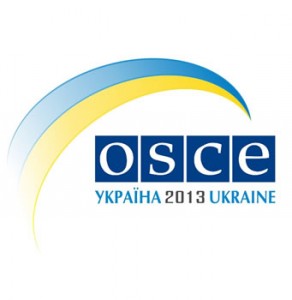
Susan Stewart at the Berlin-based German Institute for International and Security Affairs (SWP) also believes that Ukraine’s reputation has suffered in recent years because of human rights violations and backpedalling on democracy. “That’s why I think it will be difficult for Ukraine to exercise strong leadership,” Stewart said.
Ukraine is the second former Soviet republic to assume the OSCE presidency after Kazakhstan in 2010, which paved the way. But Kazakhstan was also criticized for human rights violations.
The OSCE was created during the Cold War to serve as a forum for dialogue between the warring blocs in the East and West. Today, the Vienna-based organization unites 57 nations from Europe, Central Asia and North America. It fights terrorism, seeks to resolve conflicts and helps protect the environment. Observing human rights and fundamental freedoms is a key part of OSCE’s security concept.
Old divisions threaten to paralyze its work.
Complete Article – Roman Goncharenko – Deutsche Welle
OSCE-Ukraine
Ukraine’s representative at the negotiations on the Transdniestrian conflict settlement, Ihor Kharchenko has said that the Transdniestrian conflict settlement will be the No. 1 priority during Ukraine’s presidency of the OSCE in 2013.
Ukraine, The Second Azarov’s Cabinet.
29 Dec 2012Serhiy Arbuzov, former head of the National Bank, was appointed First Vice Prime Minister.
Yuriy Boyko and Oleksander Vilkul were appointed Vice Prime Ministers.
Former foreign minister Kostiantyn Hryschenko appointed another Ukraine’s Vice Premier.
Olena Lukash became a Minister of Cabinet of Ministers. 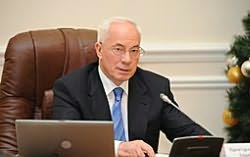
Yuri Kolobov remained at the position of Finance Minister.
Ihor Prasolov took a seat of Minister of Economic Development and Trade, which was previously occupied by Petro Poroshenko.
Eduard Stavytsky became Energy and Coal Industry Minister.
Instead of Borys Kolesnikov, the seat of Infrastructure Minister was occupied by Volodymyr Kozak, former Head of the State Railway Administration of Ukraine. While Kolesnikov became a governor of Dnipropetrovsk Oblast.
Hennady Temnyk was appointed Minister of Regional Development, Construction and Utilities.
Oleh Proskuriakov became Minister of Ecology and Natural Resources.
Natalia Korolevska was appointed Minister of Social Policy.
Oleksander Klymenko, former head of the State Tax Administration, was appointed Minister of Revenues and Duties. Yanukovych has reorganized the State Tax Service and the State Customs Service into the Ministry of Revenues and Duties of Ukraine.
Pavlo Lebedev became Defense Minister.
Vitaly Zakharchenko remained Interior Minister.
Leonid Kozhara was appointed a new Minister of Foreign Affairs.
Mykhaylo Bolotsky became Head of the reorganized State Emergency Service.
Oleksander Lavrynovych was again appointed Minister of Justice.
Dmytro Tabachnyk remained at the position of the Education Minister.
Raisa Bohatyriova was reappointed Health Minister.
Yanukovych has reappointed Mykola Prysiazhniuk as the agrarian policy and food minister.
This cabinet was appointed by President Viktor Yanukovych on 24 December 2012.
Source: Kyiv Post, Interfax Ukraine
Today we held our 30th EU-Russia Summit. This is a real tribute to the important nature of our partnership. It demonstrates the priority which we attach to this strategic relationship. Russia and the EU have a lot to gain from cooperating.
Our economies are strongly linked:
45 % of Russia’s exports go to the EU, while 35 % of Russia’s imports come from the EU.
We are neighbours on our continent. More than 5 million Schengen visas were issued in 2011 in Russia. We may have different positions in some areas but we have more common interests. We must work together to guarantee security and stability on the European continent, to tackle global challenges and governance issues, and to promote economic growth. 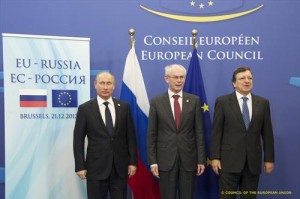
We have had a positive and constructive working summit. It provided us with an important occasion to take stock of main developments and to review progress and challenges across the wide range of EU-Russia relations. We also discussed how we can deepen our cooperation and implement already agreed commitments.
Our Partnership for Modernisation works. We have taken note of the latest Progress Report, and welcome the good results achieved in many areas. Further progress has to be made in the negotiations towards a New Agreement, which can put our future relations on a solid legal basis. The EU is very eager to progress faster in these negotiations.
We have discussed domestic economic developments in Russia and the EU. I explained the decisions of last week’s European Council regarding the strengthening of the EMU and the huge progress we made in stabilising the euro zone.
The EU is deeply convinced that we need to create space for civil society activities in order to achieve an effective modernisation of the economy and of the society.
We have noted the outcome of our latest Human Rights Consultations on 7 December which provided a useful occasion to discuss our concerns on the freedom for civil society activities and the exercise of fundamental rights in Russia. I mentioned also other concerns, including the case of Sergey Magnitsky.
As regards foreign policy, we have discussed ways to deepen our political cooperation at global level. We already work well together on issues like the Middle East Peace Process, Afghanistan or Iran. We have to continue our efforts to find a peaceful political solution on Syria in full support of Mr Brahimi’s efforts.
Russia and the EU work closely together in the Quartet, and we remain committed to a two-state solution to the Israeli-Palestinian conflict. In this respect I would like to highlight the joint statement by Foreign Minister Lavrov and High Representative Ashton today on the Middle East Peace Process.
As regards our Common Neighbourhood, I highlighted the need to achieve stability and security as well as democracy and a market-oriented economy. This is the aim of EU’s support within the Eastern Partnership Programme, especially as regards to Ukraine, Moldova and Georgia.
We welcome that the elections in Georgia open up new opportunities to improve bilateral relations and work towards stability in the Southern Caucasus, on the basis of the respect for territorial integrity.
It is particularly important to address the protracted conflicts. I also raised the importance of moving forward in the ‘5+2’ talks on the conflict in Transnistria and expressed concerns regarding developments in Nagorno-Karabakh.
By working together, the EU and Russia can make a decisive contribution to global governance and regional conflict resolution, to global economic governance in the G 8 and G 20, and to a broad range of international and regional issues. I would like to congratulate President Putin for taking over the presidency of G 20.
I am pleased that President Putin and the EU have discussed all these issues openly in a very constructive atmosphere. I want to thank the President of the Russian Federation for the constructive and productive exchange.
Press statement
by the President of the European Council
Herman Van Rompuy
following the 30th EU-Russia Summit.
Brussels, 21 December 2012
EUCO 243/12
PRESSE 557
PR PCE 206
The Ministry of Justice has received the independent report of the law firm Skadden, Arps, Slate, Meagher & Flom LLP, following its investigation of the Yulia Tymoshenko prosecution for exceeding her official powers at the conclusion of contracts between Russian Gazprom and Naftogaz Ukraine.
In accordance with the signed agreement, Skadden, Arps, Slate, Meagher & Flom LLP has delivered an independent report that clearly documents the events that were the subject of the trial and the trial itself. Through detailed analysis and a focus on the evidence, the report addresses critics, who have challenged the legal process and also the conviction, based on Yulia Tymoshenko’s claims that the prosecution was politically motivated and that her human rights have been abused. For this reason, the Ministry of Justice asked the leading international law firm to investigate the matter, taking into account all legal documents and opinions of all parties. 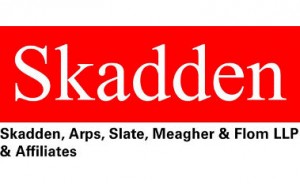
This report, published today on the Ministry’s website without amendment, concludes as groundless Yulia Tymoshenko’s claims that her prosecution was politically motivated and states that she has provided no factual evidence that would be sufficient to overturn her conviction under European or American standards.
The report also points out that Yulia Tymoshenko’s conduct in court would have been unacceptable in other countries and would likely have resulted in a contempt of court finding.
The Skadden, Arps, Slate, Meagher & Flom LLP report shows how Yulia Tymoshenko overstepped her authority and committed this crime:|
1. by drafting Directives that set forth the terms that she and Prime-minister of Russian Federation had agreed to;
2. by ordering the head of NAK Naftogaz Ukraine to sign an agreement with Gazprom in the absence of approval from the Cabinet of Ministers;
3. by threatening to fire the head of NAK Naftogaz Ukraine if he did not sign the agreement;
4. and by deceiving the head of NAK Naftogaz Ukraine into believing that the Cabinet of Ministers had approved the agreement after producing an official looking document bearing her signature and the seal of Ukraine’s Cabinet of Ministers, despite the fact no such approval had been given for the document named “Directives”.
Even where the Skadden, Arps, Slate, Meagher & Flom LLP Report questions certain procedural decisions by the court, it concludes that these decisions were based on actions by Tymoshenko designed to disrupt the court’s work.
The court concluded that Yulia Tymoshenko’s actions caused grave damage to Ukraine, since citizens of Ukraine continue to pay the highest prices in Europe for their gas due to Tymoshenko’s deal with Russia. In this sense, every citizen of this country is a victim of this crime.
The Ministry of Justice is grateful to Skadden, Arps, Slate, Meagher & Flom LLP for this professional analysis that unconditionally lays out the facts of this matter.
Contact: Press Office – Ministry of Justice
Telephone: +38 044 271 17 33
Email: press@minjust.gov.ua
Ukraine, the new Rada among fists and protests.
12 Dec 2012The Verkhovna Rada faction registered the Regions Party faction of 210 MPs. Yefremov was elected the head of the faction. The faction of the Batkivschyna United Opposition includes 99 MPs. The head of the faction is Arseniy Yatseniuk. The parliament also registered the UDAR Party faction of 42 deputies. The head of the faction is Vitali Klitschko. The Svoboda Party faction includes 37 MPs. The head of the faction is Oleh Tiahnybok. The faction of the Ukrainian Communist Party includes 33 MPs. It is headed by Petro Symonenko.
Five out of 450 Parliament seats remain empty after allegations of fraud and ballot-stuffing led election officials to schedule new votes in five dispute election districts. 
Lawmakers from Tymoshenko’s party showed up wearing black jerseys with her portrait on the front and the phrase “Freedom to Political Prisoners” written on the back. A fist fight began when opposition lawmakers shouting “No to defectors!” attacked two legislators, Oleksandr Tabalov and Andrei Tabalov (a father and a son), who had been elected on the opposition ticket but were suspected of preparing to defect to Yanukovych’s party. The three oppositional parties, which have a total of 178 out of the 445 filled seats at Verkhovna Rada, managed to block most of the pro-presidential Party of Regions initiatives.
Outside the building, members of the famous feminist group Femen took off their clothes to protest against the incompetence and corruption of the nation’s lawmakers.
Украинa, данные национальных экзит-поллов.
28 Oct 2012
|
Название партии |
Национальный exit-poll (ДемИнициативы, КМИС, Разумков) |
Всеукраинский телевизионный (TNS, SOCIS & Интер,ICTV) |
Research & Branding Group |
Рейтинг (5-й канал) |
|
Партия регионов |
28,1% |
30,48% |
31,6% |
27,6% |
|
ВО “Батькивщина” |
24,7% |
23,87% |
23,7% |
23,4% |
|
“УДАР” |
15,1% |
14,67% |
13,2% |
14,3% |
|
Коммунистическая партия Украины |
12,3% |
12,07% |
13% |
12,5% |
|
Всеукраинское Объединение “Свобода” |
11,8% |
11,92% |
11% |
12,5% |
Ucraina, un Paese profondamente diviso al voto.
28 Oct 2012 Il pugile ed il calciatore. Gli “eroi” nazionali, oggi divisi dalle elezioni legislative. Vitaly Klitschko ed Andriy Shevchenko sono i due volti nuovi della politica ucraina, da anni dominata – dopo l’eclisse del “padre” della “rivoluzione arancione” Viktor Jushenko – dallo scontro senza confini tra il presidente Viktor Janukovich e l’ex premier, ora in carcere, Julija Timoshenko. 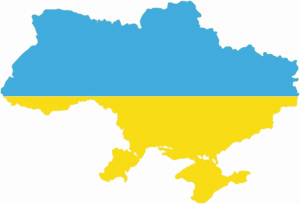
L’ex campione del mondo dei pesi massimi è il leader del partito Udar (ossia, colpo) ed è destinato a diventare il capo dell’opposizione. Se non farà errori probabilmente sarà lui ad essere il candidato da battere alle prossime presidenziali.
L’ex capocannoniere di Milan e Chelsea è, invece, il “numero due” nella formazione “Avanti Ucraina!” di Nataliya Korolevskaya e se la sua compagine supererà la fatidica barriera del 5% per avere una rappresentanza in Parlamento Shevchenko diventerà deputato.
Non è la prima volta che nell’ex Urss le “stelle” dello sport entrano in politica. Oleg Blokhin, bomber indimenticabile della grande Dinamo poi selezionatore della squadra nazionale agli ultimi Europei, è stato per ben due volte parlamentare tra le file dei social-democratici. Pochi giorni fa un altro ex calciatore, Kakha Kalaladze, già compagno di squadra di Shevchenko alla Dinamo Kiev ed al Milan, è stato addirittura nominato ministro dell’Energia e vice-premier nel nuovo governo georgiano.
“Andiamo in Parlamento – ha picchiato duro Klitschko, con un passato da eletto nel Consiglio comunale di Kiev ed un forte impegno nel sociale, – non per cambiare i maiali, ma per togliere loro la mangiatoia!”
Assai più diplomatico Shevchenko, che pare trovarsi non a proprio agio nel clima da rissa imperante da sempre sulla scena politica nazionale. “Vogliamo cambiare il Paese – ha spiegato l’ex bomber -. Il mio compito è costruire le infrastrutture”. Con Berlusconi Shevchenko si telefona, ma per ora non ha chiesto consigli.
I due “eroi” ucraini in passato hanno collaborato per varie iniziative sociali, ma questa volta si sono praticamente ignorati. Anzi, Klitschko ha rifiutato di partecipare ad un incontro pubblico col calciatore per dibattere su giovani e sport.
La ragione della sua decisione è semplice. “Avanti Ucraina!”, formatasi da una costola fuoriuscita da “Patria”, la compagine della Timoshenko, rischia di fare il gioco della formazione di Janukovich, “il partito delle Regioni”, togliendo voti all’opposizione. I sondaggi sono chiarissimi. A fronte di un 24% di indecisi, i “blu” del presidente sono al 23%, Udar al 16, “Patria” al 15 ed i comunisti al 10. Solo l’8,8% degli ucraini crede che queste legislative saranno pulite. Migliaia sono gli osservatori presenti.
Sia Unione europea che Russia guardano alla consultazione con interesse. L’Ucraina è ad un passo dalla firma di uno strategico patto di Associazione con Bruxelles ed è stata invitata allo stesso tempo da Mosca a far parte della nascente Unione doganale, una mini-Urss economica, simile alla CEE. Se il “giro di vite”, imposto al Paese da Janukovich, non è piaciuto agli occidentali Vladimir Putin spera adesso di riportare Kiev nella propria orbita.
L’economia dell’ex repubblica sovietica, però, non va. Un prestito dell’Fmi è bloccato da anni e si rincorrono voci di una prossima svalutazione della grivnia.
Questa volta Janukovich dovrà stare più attento. L’opposizione ha trovato un peso massimo e Klitschko si prepara già ai proverbiali corpo a corpo alla Rada, famosa in tutto il mondo per le più incredibili zuffe tra deputati.
Giuseppe D’Amato
Ukraine, a transparent vote?
27 Oct 2012 The parliamentary election in Ukraine will be “transparent and democratic,” President Victor Yanukovych has said. Following an example from Russia, Ukraine has installed webcams in all polling stations for maximal transparency.
The Organization for Security and Co-operation in Europe (OSCE) has sent 635 election observers to the country – more than ever before. In total, some 3,800 foreign observers monitor the vote. But only 8.8 percent of Ukrainians say the ballot will be fair, according to the Kiev-based Democratic Initiative Fund. 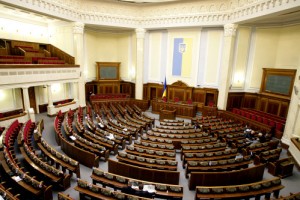
“The significant lack of political pluralism on television is very worrisome and requires immediate action,” EU foreign policy chief Catherine Ashton highlighted in a statement. The elections “will be a litmus test of Ukraine’s democratic credentials.”
The last time that Ukraine had a mixed election system – electing half of its 450 members of parliament in geographic districts, the other half through party lists – was 2002. Ten years ago, the opposition did well on the party lists, but failed to muster a majority after doing poorly in the single-mandate districts. Experts think that history will repeat itself.
The parliamentary vote marks the halfway point in Yanukovych’s first presidential term. Yanukovych’s approval rating is 12.6 percent, down from 37.8 percent in 2010, according to the Razumkov Center for Economic and Political Studies.
Polls suggest his party, the Party of Regions, will preserve its hold on the 450-seat legislature. The Party of Regions has 23.3 percent backing, compared with 16 percent for world boxing champion Vitaly Klitschko’s UDAR, 15.1 percent for Tymoshenko’s Fatherland and 10.1 percent for the Communists.
Control of Parliament will also be a major factor in the higher-stakes presidential contest in 2015. Vitali Klitschko the leader of the opposition UDAR party, seems to be a new future candidate with good chances to win.
Andriy Shevchenko, 36, a former AC Milan striker, runs for Ukraine Forward, which aims to pass parliament’s 5 percent entry barrier. That’s hurting opposition united under jailed ex-Prime Minister Yulia Tymoshenko and improving the prospects of Party of Regions.
The country has become increasingly isolated since Yanukovich’s election in a runoff with Tymoshenko in 2010. And financial analysts say that the country’s economy is in trouble again as a result of flagging demand in Europe, particularly for steel, Ukraine’s main export.
Bykivnia, the Ukrainian Katyn.
21 Sep 2012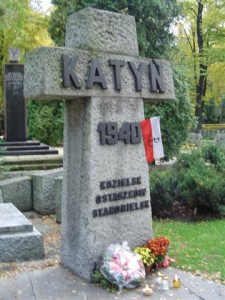
copyright EuropaRussia
“We had to wait a long time for this moment, fervently believing that it must come to pass. It is difficult to find words that express how we Poles feel” Polish President Bronislaw Komorowski said during the ceremony.
The wooded site at Bykivnia is understood to be the final resting place of 3,435 Polish citizens murdered in 1940 on Stalin’s orders by the Soviet secret police (NKVD).
The executions were part of the broader Katyn Crime in which over 22,000 Poles – largely reserve officers – were killed in mass executions at various points across the Soviet Union, including the Katyn Forest near Smolensk.
The final resting place of the Poles on the so-called “Ukrainian Katyn List” had long remained a mystery. In 2007, Polish archaeologists working at Bykivnia discovered the dog tags of Sergeant Jozef Naglik, as well as a comb with the names of four Poles inscribed on it.
The names tallied with the so-called Ukrainian List, which makes up about 15 percent of the Poles executed during the Katyn Crime. Identifying individual victims has proved largely impossible.
According to researched data, the mass burials in Bykivnia are the largest ones in Ukraine. Preliminary estimates indicate that during 1937-1941 more than 100,000 Ukrainians were also destroyed and secretly buried here.
Ukrainian President Vikor Yanukovich called the opening of the Polish war cemetery a “a moment of Solidarity between the two nations.”
Sources: Polish Radio, Memorial Kiev
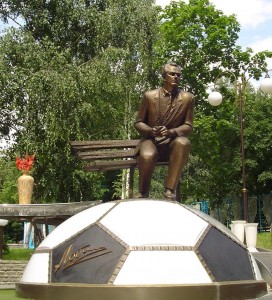
La statua dedicata a Valeriy Lobanovskiy, una delle "anime" della Dinamo Kiev.
Doveva essere la grande festa attesa da una vita ed invece Euro 2012 si è trasformata in un incubo. Almeno per la dirigenza ucraina. Negli ultimi decenni non ricordiamo una vigilia tanto tribolata.
A Cardiff, nell’aprile 2007, l’Uefa era a conoscenza dei rischi della scelta di organizzare il primo campionato di calcio oltre la vecchia Cortina di ferro. Allora si temevano di più gli euro-scettici gemelli Kaczynski in Polonia e molto meno gli arancioni filo-occidentali al potere in Ucraina.
E comunque, quando era stato varie volte primo ministro, l’azzurro Viktor Janukovich si era sempre mostrato un partner affidabile, nonostante le perenni liti interne sia con l’ex presidente Viktor Jushenko – vedi la cosiddetta “rivoluzione arancione” dell’autunno 2004 – sia con l’ex premier Julija Timoshenko.
L’Europa non è abituata, come gli ucraini, ad assistere alle ormai proverbiali risse tra deputati delle opposte fazioni alla Rada ed alle loro infinite faide, le cui conseguenze non hanno quasi mai superato i confini nazionali. Ma adesso la situazione è diversa: è il Paese intero – non solo la sua degradata classe dirigente – a rischiare di rimetterci la faccia.
L’Ucraina non è, tuttavia, una repubblica delle banane, gestita da mafiosi. La realtà storica è che quasi in modo miracoloso il caos perfetto della politica interna nazionale ha consentito la nascita di, forse, l’unica democrazia dell’ex Urss, dove la concezione di libertà di stampa e di parola non ha subito contraffazioni. Sullo sfondo di questo scenario si osserva la dura contrapposizione tra il Polo europeo e quello russo.
Ma andiamo all’evento sportivo. Diciamo subito che il Paese ha fatto i salti mortali per ospitare al massimo delle proprie possibilità Euro 2012. Calcisticamente parlando, l’Ucraina è probabilmente la migliore realtà dell’Europa orientale. La Dinamo di Kiev è facilmente accostabile al “grande Torino” o all’indimenticabile Manchester United degli anni Sessanta o all’eterna Honved di Budapest. La sua è stata una scuola, punto di riferimento sia in epoca sovietica che in quella successiva. Andriy Shevchenko è solo l’ultimo di una lunga nidiata di campioni. L’Ucraina non è oggi solo Dinamo Kiev, ma anche Shaktior Donetsk, recente campione Uefa.
I nuovi “Paperoni” locali – su tutti i fratelli Surkis e Rinat Akhmetov – hanno risollevato il calcio nazionale dal disastro post sovietico. Contemporaneamente dal 2007 si è tentato di colmare la cronica mancanza di infrastrutture. Oggi gli alberghi sono in numero maggiore e di qualità superiore al 2007, le strade e le superstrade rimangono pericolose, i treni sono migliorati. Gli aeroporti hanno terminal nuovi di zecca e faciliteranno i trasferimenti delle squadre e dei tifosi più abbienti.
Gli stadi sono tutti belli ed ultramoderni. Quelli di Kharkov e Leopoli sono, a dire il vero, un po’ piccolini, con una capienza limitata. Discorso diametralmente diverso per l’Olimpiskij di Kiev (70mila) o lo splendido impianto di Donetsk, dono da 400 milioni di dollari di Akhmetov alla sua città.
E poi in Ucraina non ci si annoia affatto. Kiev e Leopoli sono città ricche di monumenti e con una cultura unica. Kharkov e Donetsk sono più moderne, ma piene di attrattive. Ovunque ci sono aree verdi per il tempo libero dei tifosi dove fiumi di birra e musica a volume altissimo allieteranno le calde giornate in attesa delle partite.
I giornali britannici hanno invitato le mogli dei tifosi a non mandare i mariti in Ucraina: troppe le belle donne laggiù. E poi un’alta percentuale di professioniste del sesso a pagamento, aggiunge lo scandalistico “The Sun”, ha contratto pericolose malattie.
Da Euro 2012 la repubblica ex sovietica spera di lanciarsi come méta futura del turismo. Buona ospitalità e successo dei campionati sono due ingredienti essenziali per aprire definitivamente l’Ucraina al mondo esterno. Peccato che la classe dirigente di questo Paese dalle enormi potenzialità stia facendo l’impossibile per sprecare un’occasione storica, veramente unica. Per loro l’Ucraina deve rimanere la solita sfortunata provincia della globalizzazione.
Giuseppe D’Amato
Welcome
We are a group of long experienced European journalists and intellectuals interested in international politics and culture. We would like to exchange our opinion on new Europe and Russia.
Categories
- Breaking News (11)
- CIS (129)
- Climate (2)
- Energy&Economy (115)
- EU Eastern Dimension (85)
- Euro 2012 – Sochi 2014 – World Cup 2018, Sport (43)
- Euro-Integration (135)
- History Culture (198)
- International Policy (261)
- Military (74)
- Interviews (18)
- Italy – Italia – Suisse (47)
- Odd Enough (10)
- Poland and Baltic States (126)
- Religion (31)
- Russia (421)
- Survey (4)
- Turning points (4)
- Ukraine (176)
- Российские страницы (113)
Archives
- November 2020
- October 2020
- September 2020
- August 2020
- July 2020
- May 2020
- April 2020
- March 2020
- January 2020
- December 2019
- November 2019
- October 2019
- September 2019
- August 2019
- July 2019
- June 2019
- May 2019
- April 2019
- March 2019
- February 2019
- December 2018
- November 2018
- October 2018
- September 2018
- August 2018
- July 2018
- June 2018
- May 2018
- April 2018
- March 2018
- February 2018
- January 2018
- December 2017
- November 2017
- October 2017
- September 2017
- August 2017
- July 2017
- May 2017
- March 2017
- January 2017
- December 2016
- November 2016
- October 2016
- September 2016
- July 2016
- June 2016
- May 2016
- April 2016
- February 2016
- January 2016
- November 2015
- October 2015
- September 2015
- June 2015
- April 2015
- March 2015
- February 2015
- January 2015
- December 2014
- November 2014
- October 2014
- September 2014
- August 2014
- July 2014
- June 2014
- May 2014
- April 2014
- March 2014
- February 2014
- January 2014
- December 2013
- November 2013
- October 2013
- September 2013
- August 2013
- July 2013
- June 2013
- May 2013
- April 2013
- March 2013
- February 2013
- January 2013
- December 2012
- November 2012
- October 2012
- September 2012
- August 2012
- July 2012
- June 2012
- May 2012
- April 2012
- March 2012
- February 2012
- January 2012
- December 2011
- November 2011
- October 2011
- September 2011
- August 2011
- July 2011
- June 2011
- May 2011
- April 2011
- March 2011
- February 2011
- January 2011
- December 2010
- November 2010
- October 2010
- September 2010
- August 2010
- July 2010
- June 2010
- May 2010
- April 2010
- March 2010
- February 2010
- January 2010
- December 2009
- November 2009
- October 2009
- September 2009
- August 2009
Our books




